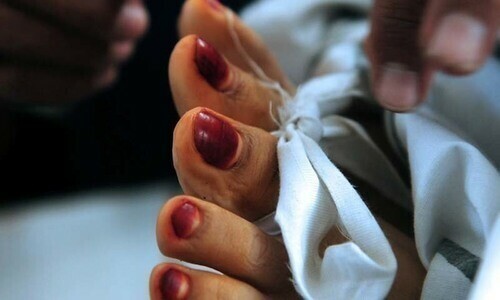KHYBER: A qahwa shop in the Landi Kotal Bazaar, built in the 1920s, continues to draw hundreds of visitors daily with its distinctive taste of green tea and traditional brewing method.
Residents call for its preservation as a heritage site, given its historical importance.
As both locals and travellers, including traders, have long been visiting the border city, they come to the dark and dingy shop with traditional wooden seating to chat away while savouring the authentic ‘sheen chai’ (green tea).
Barkat Gul, a 45-year-old owner of the shop, told Dawn that his family had been in the business for over three decades.
“My great grandfather started this business in this city and was most probably the first to open a tea shop here,” he said.
Mr Gul noted changes in pricing and customer preference over time.
“When I joined this shop in my early teens, a small kettle containing three cups of green tea used to be sold for Re1, while the same with black tea would cost Rs2, but now things have changed a lot,” he said.
In the early 50s and 60s, the tea shop used to be a favourite gathering place for tourists and local elders, poets and writers, especially members of the Khyber Adabi Jirga led by Ameer Hamza Khan Shinwari, according to him.
He said the place attracted people from all walks of life daily wanting to have its iconic green tea.
Mr Gul, a fourth-generation tea vendor, said his shop was visited by 200-250 tea enthusiasts daily, making it the most popular tea shop in the Landi Kotal Bazaar.
He said inflation forced him into increasing the tea rate to Rs40 per kettle and black tea’s to Rs70 per kettle, but tourists continued to throng the shop due to the unique taste of the green tea.
Local tour guide Ali Khan Afridi insisted that green tea was the favorite beverage among locals and tourists, especially during the summer season.
He said there was something special about water.
“Tourists come to this oldest green tea shop in the Landi Kotal Bazaar in large numbers,” he said.
Gul Zardan Kaka, 85, fondly recalled visiting the tea shop after having traditional Shinwari tikka (wreetha) and said green tea was normally taken after food in the region.
Hasan Ali Shinwari, a tourist guide, called for the preservation of such places as heritage sites to boost tourism in the region.
“This old tea shop’s traditional wooden architecture and floor mats serve as a window into our region’s rich cultural past,” he said.
Published in Dawn, August 3rd, 2024













































